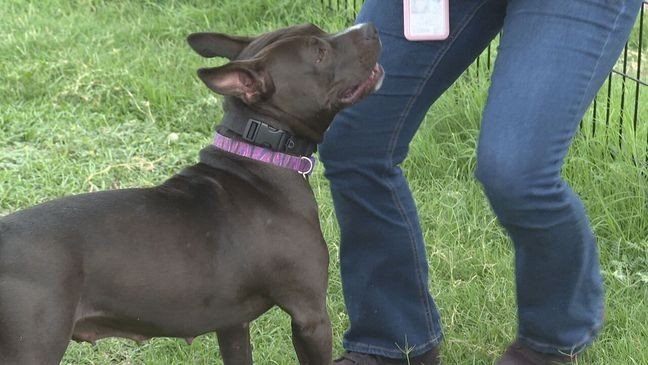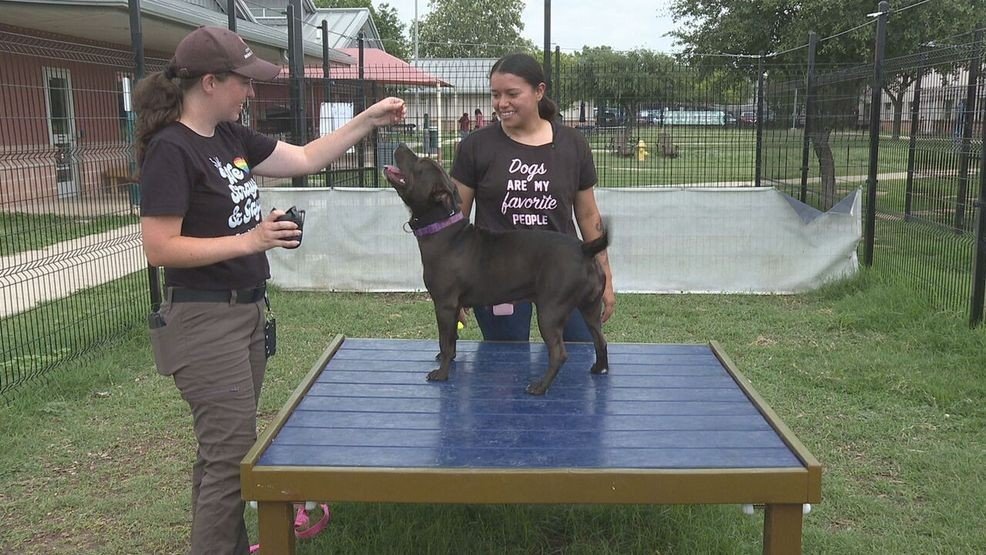What do you think is the most rewarding part of being a pet owner? If you’re like many, you probably find immense joy in the companionship and unconditional love that your furry friend offers. However, alongside this joy can come challenges, especially when it comes to behavior management. Fortunately, you’re not alone in this journey. In San Antonio, resources are available to help you effectively train and manage your pet’s behavior.

This image is property of prod-gamecenter-assets.nmp.sinclairstoryline.com.
Understanding Possessive Behaviors in Dogs
It’s essential to recognize that possessive behaviors in dogs can manifest in various ways. An understanding of these behaviors will help you manage them effectively. Possessiveness might include guarding food, toys, or even you! Knowing what to look for can significantly ease frustrations and improve the bond you share with your furry friend.
Common Signs of Possessive Behaviors
Many dog owners may unknowingly encourage possessive behaviors. Here are some signs to watch for:
- Growling: If your dog growls when someone approaches their food bowl, it’s a clear signal they feel protective.
- Stiff Body Language: A possessive dog may stand rigidly or exhibit tense facial expressions when someone nears their items.
- Barking: Increased barking can signal that your dog is on alert and defensive about something they believe is theirs.
By being vigilant and recognizing these signs, you can take proactive steps to address these behaviors before they escalate.
Why Do Dogs Develop Possessive Behaviors?
Understanding the root cause of possessive behaviors can provide insight into managing them. Dogs are instinctively protective creatures, often harboring a strong desire to guard resources that are vital for their survival. This instinct can stem from several factors:
- Environment: Dogs who have been raised in a resource-scarce environment may be more likely to guard their belongings.
- Socialization: Insufficient socialization with other dogs and people can lead to possessiveness as your dog may not know how to share or interact properly.
As a pet owner, being aware of these influences will help you nurture a more positive approach to managing your dog’s behaviors.
The Role of San Antonio Animal Care Services (ACS)
San Antonio Animal Care Services is committed to fostering responsible pet ownership through education and training. Their approach acknowledges both the challenges pet owners face and the importance of behavior management for improving the quality of life for pets and their families.
Empowering Pet Owners through Training
The ACS hosts specialized classes focused on addressing possessive behaviors. These classes are designed to empower you as a pet parent. The guidance from professional trainers can demystify the training process, making it not only achievable but also enjoyable.
What to Expect from Training Sessions
During training sessions, you will learn various strategies to manage your dog’s possessive tendencies. Here’s a brief overview of what you might cover:
- Identifying Signs of Guarding: Trainers will help you spot behaviors that indicate your dog is being possessive.
- Techniques for Addressing Behaviors: You will gain insight into positive reinforcement techniques that can help mitigate guarding behaviors.
- Communication Skills: Learning how to communicate effectively with your dog is key to modifying undesirable behaviors.
The Importance of Ongoing Training
Even older dogs can learn new behaviors. Training is not only for puppies; it is beneficial at any age. If you have an older dog that’s set in its ways, don’t worry. With the right motivation and effective communication, older dogs can still learn and adapt!

This image is property of foxsanantonio.com.
Benefits of Positive Training Techniques
Understandably, many pet owners may feel overwhelmed when it comes to dog training. Integrating positive training techniques allows you to foster a supportive learning environment for your pet.
Building a Stronger Bond
When you engage in positive reinforcement, you strengthen your bond with your dog. Rewarding good behavior rather than punishing negative behavior encourages trust and respect in your relationship.
Reduced Stress for Both You and Your Pet
Training sessions should be enjoyable for both of you. Using positive techniques reduces frustration and can decrease stress that both you and your dog may experience during training sessions. Keeping training light-hearted leads to better retention of learned behaviors.
Techniques to Manage Possessive Behaviors
You may feel anxious about addressing possessive behaviors, particularly if your dog has a history of guarding. However, below are some tried and tested methods that can help you manage these behaviors:
1. Create a Safe Space
Establishing a dedicated space for your dog can be beneficial. By creating a safe and comfortable area, your dog may feel more secure and less prone to guarding behaviors. This can be a cozy bed or corner in your home that they associate with comfort.
2. Use Controlled Introductions
When introducing your dog to new people or pets, ensure these introductions are controlled. Use leashes and assess your dog’s comfort level before allowing interaction. Gradually expose your dog to new experiences as they become more comfortable.
3. Implement Trade Games
Engaging your dog in trade games can help reduce guarding behaviors. This involves teaching your dog that giving up a toy or food item can lead to something better. For instance, offer a high-value treat in exchange for a toy. Over time, your dog learns that sharing can result in positive outcomes.
4. Incorporate Obedience Training
Basic obedience training forms the foundation for advanced behavior management. Teach commands like “leave it” or “drop it.” This not only reinforces good behavior but also enhances communication between you and your dog.
5. Seek Professional Help if Needed
If possessive behaviors persist, seeking the assistance of a professional trainer can provide you with tailored strategies. Sometimes, having an expert assess the situation and offer targeted advice can make all the difference.

This image is property of prod-gamecenter-assets.nmp.sinclairstoryline.com.
Meeting Other Pet Owners
One of the beautiful aspects of community classes like those offered by ACS is the opportunity to meet other pet owners. Sharing experiences with fellow pet parents can relieve some of the stress and loneliness you might feel. Plus, it offers a chance to learn from others who might be facing similar challenges.
Benefits of Networking with Fellow Pet Owners
Building a community can be an invaluable resource. You can share tips, trade stories, and support one another as you navigate the journey of pet ownership.
- Group Support: Knowing that you’re not alone in facing behavioral challenges can lift your spirits.
- Resource Sharing: Others may have suggestions for trainers, products, or strategies that you haven’t yet considered.
Conclusion
Being a responsible pet owner is a rewarding experience, filled with love and challenges. San Antonio Animal Care Services provides thoughtful programs designed to help you manage your dog’s possessive behaviors. Participating in these classes not only educates you but also strengthens the bond between you and your furry friend.
By recognizing the signs of possessive behaviors, understanding their root causes, and utilizing positive training techniques, you can improve the quality of life for both you and your dog. Remember that ongoing training is key at any age, and finding the right techniques and support systems, like those offered by ACS, can make all the difference.
As you continue your journey with your pet, keep in mind that patience and consistency are essential. Armed with the right knowledge and tools, you will be able to foster a well-mannered dog that enriches your life in countless ways. Whether it’s a new trick learned or simply enjoying a more peaceful home, the rewards of sound training will undoubtedly shine through.

This image is property of foxsanantonio.com.


